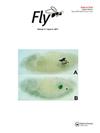Mitochondrial dysfunction generates a growth-restraining signal linked to pyruvate in Drosophila larvae
IF 2.2
4区 生物学
Q3 BIOCHEMISTRY & MOLECULAR BIOLOGY
引用次数: 3
Abstract
ABSTRACT The Drosophila bang-sensitive mutant tko25t, manifesting a global deficiency in oxidative phosphorylation due to a mitochondrial protein synthesis defect, exhibits a pronounced delay in larval development. We previously identified a number of metabolic abnormalities in tko25t larvae, including elevated pyruvate and lactate, and found the larval gut to be a crucial tissue for the regulation of larval growth in the mutant. Here we established that expression of wild-type tko in any of several other tissues of tko25t also partially alleviates developmental delay. The effects appeared to be additive, whilst knockdown of tko in a variety of specific tissues phenocopied tko25t, producing developmental delay and bang-sensitivity. These findings imply the existence of a systemic signal regulating growth in response to mitochondrial dysfunction. Drugs and RNAi-targeted on pyruvate metabolism interacted with tko25t in ways that implicated pyruvate or one of its metabolic derivatives in playing a central role in generating such a signal. RNA-seq revealed that dietary pyruvate-induced changes in transcript representation were mostly non-coherent with those produced by tko25t or high-sugar, consistent with the idea that growth regulation operates primarily at the translational and/or metabolic level.果蝇幼虫线粒体功能障碍产生与丙酮酸相关的生长抑制信号
果蝇bangs敏感突变体tko25t由于线粒体蛋白合成缺陷而表现出氧化磷酸化的全局缺陷,在幼虫发育中表现出明显的延迟。我们之前在tko25t幼虫中发现了许多代谢异常,包括丙酮酸和乳酸升高,并发现在突变体中,幼虫肠道是调节幼虫生长的关键组织。本研究证实,野生型tko在其他几种tko25t组织中的表达也能部分缓解发育迟缓。这些影响似乎是加性的,而在多种特定组织中,tko的下调会表型化tko25t,产生发育迟缓和bang敏感性。这些发现暗示存在一个系统信号调节生长,以应对线粒体功能障碍。以丙酮酸代谢为靶点的药物和rnai与tko25t相互作用的方式表明,丙酮酸或其代谢衍生物在产生这种信号中起着核心作用。RNA-seq显示,膳食丙酮酸诱导的转录物表达变化与tko25t或高糖产生的变化大多不一致,这与生长调节主要在翻译和/或代谢水平上起作用的观点一致。
本文章由计算机程序翻译,如有差异,请以英文原文为准。
求助全文
约1分钟内获得全文
求助全文
来源期刊

Fly
生物-生化与分子生物学
CiteScore
2.90
自引率
0.00%
发文量
17
审稿时长
>12 weeks
期刊介绍:
Fly is the first international peer-reviewed journal to focus on Drosophila research. Fly covers a broad range of biological sub-disciplines, ranging from developmental biology and organogenesis to sensory neurobiology, circadian rhythm and learning and memory, to sex determination, evolutionary biology and speciation. We strive to become the “to go” resource for every researcher working with Drosophila by providing a forum where the specific interests of the Drosophila community can be discussed. With the advance of molecular technologies that enable researchers to manipulate genes and their functions in many other organisms, Fly is now also publishing papers that use other insect model systems used to investigate important biological questions.
Fly offers a variety of papers, including Original Research Articles, Methods and Technical Advances, Brief Communications, Reviews and Meeting Reports. In addition, Fly also features two unconventional types of contributions, Counterpoints and Extra View articles. Counterpoints are opinion pieces that critically discuss controversial papers questioning current paradigms, whether justified or not. Extra View articles, which generally are solicited by Fly editors, provide authors of important forthcoming papers published elsewhere an opportunity to expand on their original findings and discuss the broader impact of their discovery. Extra View authors are strongly encouraged to complement their published observations with additional data not included in the original paper or acquired subsequently.
 求助内容:
求助内容: 应助结果提醒方式:
应助结果提醒方式:


